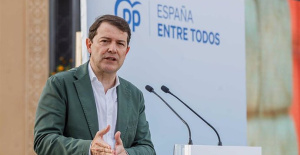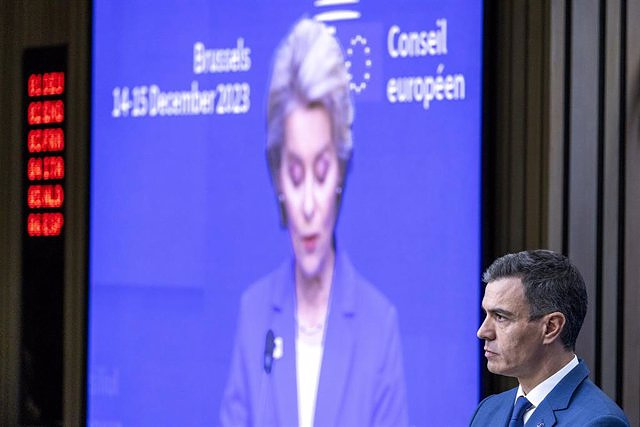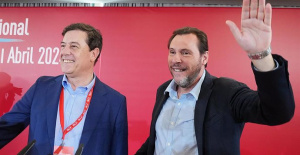Michel speaks of accusations without "regrettable" evidence and underlines the sovereignty of each member of the EU
BRUSELAS, 15 Dic. (EUROPA PRESS) -
The president of the European Commission, Ursula von der Leyen, has avoided giving a clear opinion on the accusations made by the Popular Party, which equates the situation of the Rule of Law in Spain with Poland and Hungary, after the PSOE agreed on an Amnesty Law with the independence parties in exchange for the investiture of Pedro Sánchez.
At the press conference after finishing the summit of European leaders that she offered together with Sánchez and the president of the European Council, Charles Michel, Von der Leyen, was questioned by the criticism of the PP, which compares what is happening in Spain with Poland and Hungary, two countries that have open processes for undermining the rule of law.
Specifically, Poland and Hungary have activated Article 7 of the European Union, a procedure that is initiated against states that "serious and persistent" infringe the principles on which the Union is based.
When questioned about this, Von der Leyen pointed out that the European Commission is the "guardian of the European treaties" and in their day-to-day work they work to ensure that the rules are respected by the 27. Without making any distinction between countries , has indicated that it has "full confidence" in the Member States" as that is the basis of the joint work and cooperation they carry out.
On the other hand, Michel has also been questioned about the criticism of the Amnesty Law that is being carried out in the European institutions and the possibility that they are damaging the balance of the Spanish presidency of the Council of the EU, which ends this year. month.
In this sense, he pointed out that the European project is based on respect for the sovereignty of the Member States and trust in their democratic institutions. "I think accusations without evidence are regrettable," she said.
As the "guardian of the Treaties", the European Commission is responsible for monitoring that the countries of the bloc do not deviate from Community legislation and, if not, initiating infringement proceedings against offenders, whose case may come before the Court of Justice of the European Union if they persist in non-compliance.
Furthermore, if it detects a serious systemic threat to the rule of law in a country, the European Commission has the ability to activate Article 7 of the Treaties, which may ultimately lead to suspending the voting rights of the country that persist in violations of the rule of law.
Only Poland and Hungary are subject to this article and, in the case of Budapest, it has also seen community funds frozen due to its undemocratic reforms.
For his part, Sánchez has also been asked about the debate that the amnesty is generating in Europe and the hypothetical damage that it would be causing both to the balance of the rotating presidency and to the image of the head of the Spanish Executive.
"The truth is that I have little say in the perception that others have of me," responded Sánchez, who considers it "a mistake" to criticize his Government, which is "progressive and pro-European", as he has defended.
He has also defended his intervention this Tuesday in the European Parliament in Strasbourg (France) in which he had a tough scuffle with the leader of the European Popular Party, Manfred Weber. The German politician reproached the independence supporters for the Amnesty Law and Sánchez responded by blaming him for the pacts with the extreme right and reproached him for the fact that the right is adopting many of his ideas.
He even asked Weber if he would want streets and squares in Berlin to be named after the leaders of the Third Reich, as in his opinion is happening in Spain in places where PP and Vox govern, an extreme that has denied the formation of Santiago Abascal.
In any case, Sánchez has defended his intervention against Weber by pointing out that he conveyed a reflection that leaders of the European People's Party itself have also made. In that sense, he recalled that Weber's predecessor at the head of the EPP, Polish Prime Minister Donald Tusk, said that "the problem with flirting with the extreme right is that you end up thinking like them," according to Sánchez.
Von der Leyen has had the opportunity to meet bilaterally this week in Brussels with both Sánchez and the leader of the PP, Alberto Núñez Feijóo, taking advantage of the presence of both in the European capital.
Von der Leyen's team limits both meetings to addressing the issues that have been discussed in the European Council, such as the European budget or the accession of Ukraine, although Feijóo told the media that he also expressed his concern about the Amnesty Law.

 Exploring Cardano: Inner Workings and Advantages of this Cryptocurrency
Exploring Cardano: Inner Workings and Advantages of this Cryptocurrency Seville.- Economy.- Innova.- STSA inaugurates its new painting and sealing hangar in San Pablo, for 18 million
Seville.- Economy.- Innova.- STSA inaugurates its new painting and sealing hangar in San Pablo, for 18 million Innova.- More than 300 volunteers join the Andalucía Compromiso Digital network in one month to facilitate access to ICT
Innova.- More than 300 volunteers join the Andalucía Compromiso Digital network in one month to facilitate access to ICT Innova.-AMP.- Ayesa acquires 51% of Sadiel, which will create new technological engineering products and expand markets
Innova.-AMP.- Ayesa acquires 51% of Sadiel, which will create new technological engineering products and expand markets Mañueco emphasizes that Spain does not want "a president in hiding" and "surrounded by justice"
Mañueco emphasizes that Spain does not want "a president in hiding" and "surrounded by justice" The 'number three' of the PSOE, Santos Cerdán, will appear this week in the Senate commission of the Koldo case
The 'number three' of the PSOE, Santos Cerdán, will appear this week in the Senate commission of the Koldo case The 'Freedom Flotilla' denounces Israel's "sabotage" of its mission and asks for support and dissemination
The 'Freedom Flotilla' denounces Israel's "sabotage" of its mission and asks for support and dissemination 12M.- Díaz: "I ask Mr. Feijóo to stop laminating the politics of our country"
12M.- Díaz: "I ask Mr. Feijóo to stop laminating the politics of our country" How Blockchain in being used to shape the future
How Blockchain in being used to shape the future Not just BTC and ETH: Here Are Some More Interesting Coins Worth Focusing on
Not just BTC and ETH: Here Are Some More Interesting Coins Worth Focusing on UPV students build a prototype of a wooden house to move to Equatorial Guinea
UPV students build a prototype of a wooden house to move to Equatorial Guinea The UA opens the call for the Impulso 2024 Awards for the best innovative business initiatives
The UA opens the call for the Impulso 2024 Awards for the best innovative business initiatives ALI, virtual assistant from Alicante, internationally recognized by the OECD
ALI, virtual assistant from Alicante, internationally recognized by the OECD Retrópolis brings the golden age of video games and computing to the UPV
Retrópolis brings the golden age of video games and computing to the UPV A million people demonstrate in France against Macron's pension reform
A million people demonstrate in France against Macron's pension reform Russia launches several missiles against "critical infrastructure" in the city of Zaporizhia
Russia launches several missiles against "critical infrastructure" in the city of Zaporizhia A "procession" remembers the dead of the Calabria shipwreck as bodies continue to wash up on the shore
A "procession" remembers the dead of the Calabria shipwreck as bodies continue to wash up on the shore Prison sentences handed down for three prominent Hong Kong pro-democracy activists
Prison sentences handed down for three prominent Hong Kong pro-democracy activists ETH continues to leave trading platforms, Ethereum balance on exchanges lowest in 3 years
ETH continues to leave trading platforms, Ethereum balance on exchanges lowest in 3 years Investors invest $450 million in Consensys, Ethereum incubator now valued at $7 billion
Investors invest $450 million in Consensys, Ethereum incubator now valued at $7 billion Alchemy Integrates Ethereum L2 Product Starknet to Enhance Web3 Scalability at a Price 100x Lower Than L1 Fees
Alchemy Integrates Ethereum L2 Product Starknet to Enhance Web3 Scalability at a Price 100x Lower Than L1 Fees Mining Report: Bitcoin's Electricity Consumption Declines by 25% in Q1 2022
Mining Report: Bitcoin's Electricity Consumption Declines by 25% in Q1 2022 Oil-to-Bitcoin Mining Firm Crusoe Energy Systems Raised $505 Million
Oil-to-Bitcoin Mining Firm Crusoe Energy Systems Raised $505 Million Microbt reveals the latest Bitcoin mining rigs -- Machines produce up to 126 TH/s with custom 5nm chip design
Microbt reveals the latest Bitcoin mining rigs -- Machines produce up to 126 TH/s with custom 5nm chip design Bitcoin's Mining Difficulty Hits a Lifetime High, With More Than 90% of BTC Supply Issued
Bitcoin's Mining Difficulty Hits a Lifetime High, With More Than 90% of BTC Supply Issued The Biggest Movers are Near, EOS, and RUNE during Friday's Selloff
The Biggest Movers are Near, EOS, and RUNE during Friday's Selloff Global Markets Spooked by a Hawkish Fed and Covid, Stocks and Crypto Gain After Musk Buys Twitter
Global Markets Spooked by a Hawkish Fed and Covid, Stocks and Crypto Gain After Musk Buys Twitter Bitso to offset carbon emissions from the Trading Platform's ERC20, ETH, and BTC Transactions
Bitso to offset carbon emissions from the Trading Platform's ERC20, ETH, and BTC Transactions Draftkings Announces 2022 College Hoops NFT Selection for March Madness
Draftkings Announces 2022 College Hoops NFT Selection for March Madness























